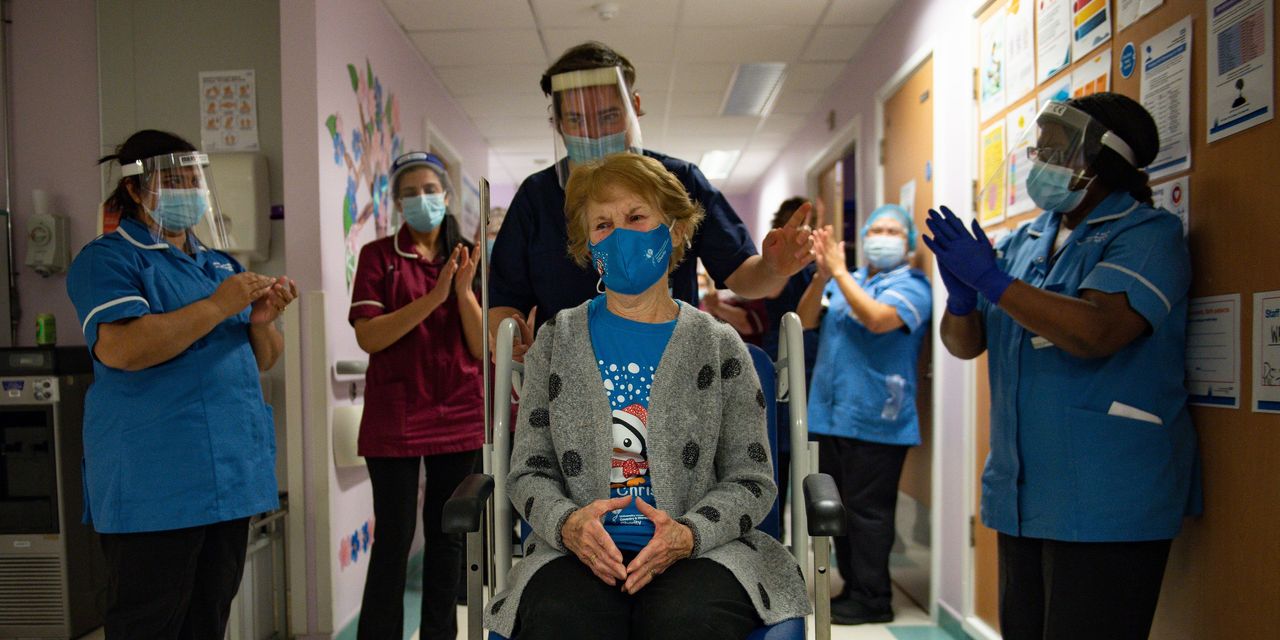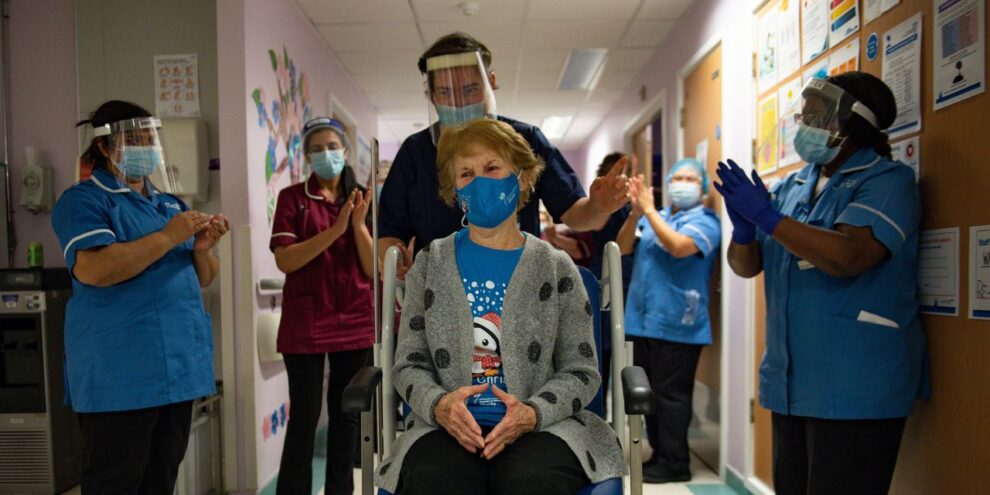
Manufacturing delays mean just 4 million doses of the vaccine candidate being developed by drugmaker AstraZeneca AZN, +0.97% and the University of Oxford will be delivered to the U.K., falling short of the 30 million doses the country had hoped to receive by the end of the year.
News of the shortfall comes as the U.K. became the first country to embark on a mass immunization program, with National Health Service hospitals on Tuesday starting to administer 800,000 shots of the vaccine developed by U.S. drugmaker Pfizer PFE, +2.26% and its German partner BioNTech BNTX, +4.75%.
U.K. regulators granted emergency authorization for the vaccine on Dec. 2. European Union regulators are also reviewing the shot, alongside rival vaccines being developed by U.S. biotechnology company Moderna MRNA, +4.59% and the AstraZeneca AZN, -0.90% candidate.
Both Pfizer’s and Moderna’s vaccines have been shown to have 95% efficacy at protecting people against coronavirus.
On Tuesday, Margaret Keenan, who turns 91 next week, was the first person to be given the jab by nurse May Parsons at 6.31 a.m. GMT at University Hospital in Coventry, in central England, on what health secretary Matt Hancock dubbed ‘V Day.’
“I feel so privileged to be the first person vaccinated against COVID-19, it’s the best early birthday present I could wish for because it means I can finally look forward to spending time with my family and friends in the new year after being on my own for most of the year,” Keenan told the BBC.
Read: Who will be given priority for the Pfizer-BioNTech COVID-19 vaccine?
The NHS said that the vaccine is being offered in some hospitals to some people aged over 80, people who work in care homes, and health workers at high risk. “The vaccine will be offered more widely, and at other locations, as soon as possible,” the NHS said in a statement.
Prime Minister Boris Johnson tweeted: “Today the first vaccinations in the U.K. against COVID-19 begin. “Thank you to our NHS, to all of the scientists who worked so hard to develop this vaccine, to all the volunteers — and to everyone who has been following the rules to protect others. We will beat this together.”
The U.K. has secured 800,000 doses of the Pfizer-BioNTech vaccine, which will be administered in the coming weeks. It has placed orders for 40 million in total — enough for 20 million people, as two shots are required at least 21 days apart.
The wide distribution of the Pfizer vaccine has been made harder by logistical issues, as the shot has to be stored at minus-70 degrees Celsius (-94 degrees Fahrenheit). By comparison, the AstraZeneca vaccine candidate can be stored in normal refrigerator-like temperatures, making it easier to store and transport.
The immunization program will be a “marathon not a sprint,” said Prof. Stephen Powis, national medical director for NHS England, adding that “This really feels like the beginning of the end.”
On Tuesday, Hancock told the BBC that he “very much” hoped that the AstraZeneca vaccine would be approved by U.K. regulators in the next couple of weeks. Full data from late-stage clinical trials, involving 24,000 people, haven’t yet been published.
A U.S. study of AstraZeneca’s vaccine involving around 30,000 volunteers is currently in progress, and should deliver data by late January.
Read: What side effects, if any, can you expect from a COVID-19 vaccine shot?
However, the U.K. government’s vaccines task force said on Monday that just 4 million doses of the AstraZeneca vaccine would be delivered this year — imported from the Netherlands and Germany — compared with the 30 million shots it had hoped for, after manufacturing delays.
“To accelerate vaccine production and supply involves collaboration with more than 20 supply partners in more than 15 countries, supported by more than 20 analytical testing sites,” AstraZeneca said in a Nov. 25 statement.
The government is expected to start a trial in January to examine whether mixing and matching vaccines gives better protection than two doses of the same one, said Kate Bingham, outgoing chair of the U.K.’s vaccine task force.
Volunteers who participate in the trial will be given one shot of AstraZeneca’s vaccine — if it is approved — and one of Pfizer’s jab. Moderna will also be included in the trial if its shot is approved, the Guardian reported.
Giving a progress report on the first six months of the task force on Monday, Bingham said the “mix and match” trials weren’t about limited supplies of the vaccine but were about triggering the immune response and the durability.











Add Comment